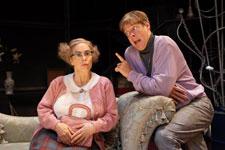Soulpepper’s reputation as one of Canada’s foremost class-ical repertory theatres, making significant inroads into mentoring and actor training, can be seen at its most high-spirited and refined in the double bill curr-ently playing at the Young Centre for the Performing Arts. Tom Stoppard’s The Real Inspector Hound and Peter Shaffer’s Black Comedy add a bit of classic post-modern comedy to the season’s mix. Audiences are treated to one acts that refer, in clever and hilarious ways, to the very making of that very theatrical thing we call a play.
Stoppard’s light meditation on the role of criticism in the theatre opens the evening with Birdboot and Moon, two acerbic reviewers, sitting together in box seats and discussing the state of current theatrical enterprise, among other things. In the roles of these two farcical fellows, Oliver Dennis as Moon and Michael Simpson as Birdboot provide perfect foils for each other’s particular take on the night’s proceedings as they are gradually drawn into the onstage narrative in a very funny manner. Corrine Koslo’s Mrs Drudge sets the tone for the play within a play within a play as she creates a stock comic servant character with a perfect balance of arch, haughty characterization and delightfully hysterical physical play.
Director Jim Warren has found a stylish and pleasing way to bring these two works together with a versatile cast which is nearly unrecognizable as characters from the previous offering as they take the stage in Black Comedy, an equally farcical tale of characters struggling with the mechanics of the theatre. Shaffer’s use of onstage lighting and total darkness for various scenes is a simple and clever device that adds touches of metaphoric angst to the evening.
Light and dark represent the emotional limitations of a group of people stranded in a darkened Kensington flat on the ground floor of a large subdivided house. The broad, melodramatic comedy of Stoppard’s piece becomes a more understated, yet highly physical, acting strategy for the ensemble’s approach to Shaffer’s work, revealing, in one fell swoop, the diversity of Soulpepper’s company of artists. One extremely challenging scene has Mike Shara as Brindsley falling down a staircase with remarkable, stylized ease, while Caroline Cave’s Carol provides equally effective physical comedy as she stumbles around an electrically challenged apartment that the audience sees with the clarity of bright theatre lighting.
Shaffer’s metaphoric use of light as darkness and vice versa is featured gaily in the character of Harold, the fey middle-aged bachelor who is possessive of the younger Brindsley. Shaffer’s character description provides stereotypical clues to Harold’s sexual proclivities as he is described as an antique shop-owning bachelor prone to possessive behaviour once slighted by an object of affection. As Harold, Oliver Dennis inserts a fine blend of physical comedy and gestural vocalization that is attuned to Shaffer’s clues without being heavy-handed. Although seemingly closeted, Harold never hesitates, in Shaffer’s adept playwriting hand, to blithely utter double entendres to Brindsley such as, “It’s rather cosy in the dark, isn’t it?” or, as he lights a match, “I hope I’ve got the right end.” Indeed, light and dark make hilarious bedfellows in this absurd romp, rounding out the double bill with another stylish and classic British comedy that has withstood the test of time.
Both Stoppard and Shaffer have created diverse bodies of work ranging from high comedy to intense drama, the perfect blend for a company as adept and diverse as Soulpepper.

 Why you can trust Xtra
Why you can trust Xtra


